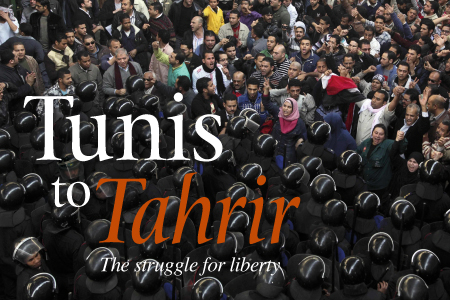
Tunis to Tahrir - The Struggle for Liberty
Issue 78 March 2011
The beauty of people power burst onto the streets of Tunisia and Egypt. After decades of living under oppression, they finally found their voice.
Award winning Egyptian blogger, Ethar El-Katatney, gives a running commentary on the most astonishing revolution the Middle East has witnessed.
It reads like a movie script: innocent young man is tortured and killed by corrupt police officers. A Google executive sets up a Facebook page in the man’s name calling for countrywide demonstrations. No one expects anything to happen - after all, nothing has happened in 30 years. Shockingly, hundreds of thousands turn up. The police use tear gas, batons, water cannons and rubber bullets against them. National television reports a day later that there are ‘tens’ of protesters. The ruling party headquarters are burned in every city in the country. Banks close. The stock market stops trading.
The state cuts off communications and the internet for a week. It imposes a curfew. It removes all policemen from the street, and thousands of prisoners ‘somehow’ escape, looting stores and attacking homes. Young men create committees to protect their homes, using makeshift weapons from kitchen knives to chair legs. Terrified, citizens lock their doors. The army descends upon the city, with tanks on every corner and are greeted with open arms.
The 82-year old president appears on television a week after protests begin and delivers an impassioned speech, saying he will reform, and that he was born, and will die, on the country’s soil. But, he will not step down. The next day, protesters who support the president magically appear, armed with weapons and riding camels and horses. They attack the protesters with live ammunition. Fires break out, buildings burn down, and Molotov cocktails are thrown. The death toll climbs to over 300 people, and thousands are wounded. A crackdown on journalists begins, and they fear for their lives. And that’s all just the tip of the iceberg. Act I. And it’s all too chillingly real.
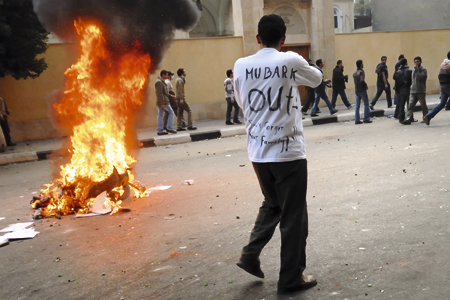
I never thought I would sleep with a knife under my pillow. I never thought I would be on first-name terms with the soldier manning a tank under my house. I never thought my friend would lose an eye to a bullet. I never thought I would be alive to witness history being made. I never thought a lot of things. But most of all, I never realised how powerful we were all along.
Egyptians have the whole world watching. It’s unprecedented, it’s shocking, and it’s incredibly inspiring. It still feels a little surreal. A little like a dream. As if you’re watching an incredibly exciting movie. I’ve traversed the full spectrum of emotions in the past three weeks - fear, hope, love, pride, distaste, sympathy, anger, just to name a few.
I never thought Tahrir Square, which I used to drive through every day to university, would turn into a mini-utopia, a vision of what we dreamed Egypt could be. It’s indescribable. For those who have been on Hajj, you will know what I mean; the smiling, hopeful and proud faces.
“I was standing with a group of friends,” says Sahar El-Nadi, “when one man in his late 60s stopped to tell us loudly so everyone around could hear, ‘Your shoes are on top of my head [an Arab expression of extreme respect]; we revere the dust you walk on, you’re much better than us older people because you are brave, you restored our dignity and made us love our country again. You brought back our Egypt when we were weak. May God protect you and bring us victory through your blessed efforts’.
People are praying together, joking together, singing the national anthem together. It’s overwhelming. Intoxicating. There is a sense of unity that surpasses all expectation, “I felt like all Egyptians,” says Ahmed Aboraya, “Muslims and Christians, old and young, were all the same. It didn’t matter what was your religion or ideology or political inclination. Who would have ever thought that Muslim Brotherhood members would attend a Christian mass?”
To see Egyptians picking up their rubbish - even separating it into organic and non-organic waste - is unbelievable. People are washing the streets and giving out free food. Doctors are volunteering their time and setting up makeshift clinics around the square. A tented city was set up. For many Egyptians, Tahrir Square became a second home. Concerts, plays, poetry recitals were all held here. A city within a city. “There’s just an amazing spirit of love,” says Noha Zaki. “I’ve never felt this way before.”
Hosni Mubarak, after 30 years of ruling Egypt, was just as shocked as the rest of us at the magnitude of the protests, at the fury of the people. Partially influenced by the events in Tunisia, six Egyptians set themselves on fire. And exactly a month after the Tunisian revolts, emboldened by their success (“Tunisia sneezed and the Arab world got a cold,” joked a protester), Egyptians who have been suffering from corruption, unemployment, poverty and crippled education and health systems for decades took to the streets.
Audemars Piguet Replica Watches
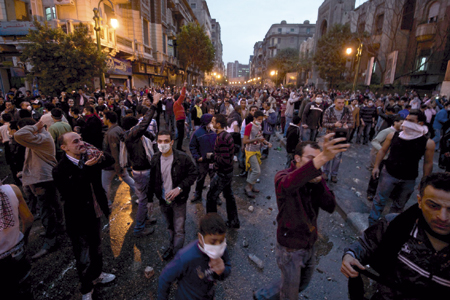
Mubarak finally spoke. He appointed a vice president, Omar Suleiman. He said he would not run for office again; that his son, Gamal Mubarak, would not run. The government resigned and a new one was appointed with a new prime minister, Ahmed Shafik. Four of Egypt’s now ex-ministers were to stand trial, as well as a number of Egypt’s businessmen. Some members of the National Democratic Party resigned. Five articles of the Constitution were to be amended, and one deleted. The emergency law was to be lifted. Parliamentary elections were to be re-held for some MPs. On the surface, the changes seem dizzying. But for Egyptians who have been silent for far too long, who have heard empty promises for decades, it wasn’t enough. Once the barrier of fear had been broken, Egyptian resilience was put to the test. The protests snowballed, and spread across the country, maintaining their momentum.
They seemed to be quietening down, only to be given a huge boost by the release of Wael Ghonim, the Google executive who is largely credited with starting it all. He had been arrested soon after the strikes began, and released after a massive online campaign. Immediately after, he gave an emotional speech broadcast all over Egypt and watched by hundreds of thousands, saying the strikes were far from over. For the time being, he seems to be the public face of the protesting youth.
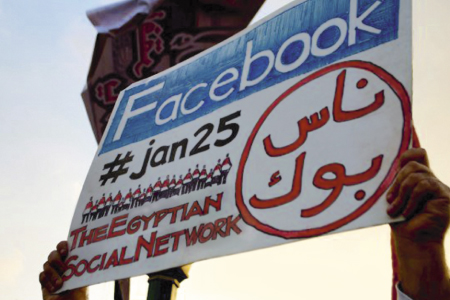
A couple of days later, labour unions joined in the protests, with thousands of people striking. Government control over state media, which promoted numerous conspiracy theories and would run with headlines such as “Millions turn out to support Mubarak”, frayed, with employees walking out. Negotiations with opposition groups soured. The situation escalated, and people would not accept anything except the immediate resignation of the president. Their fury was unmatched. The people, sick of decades and decades of promises reneged upon, remained unmoved.
Opposing voices were small and quiet, ‘calm down everyone’, ‘the country will descend into anarchy’, ‘the president has done enough’, ‘the army has guaranteed that it will make sure all promises are fulfilled, and if it doesn’t, we can take to the streets again.’ But all these voices fell on deaf ears.
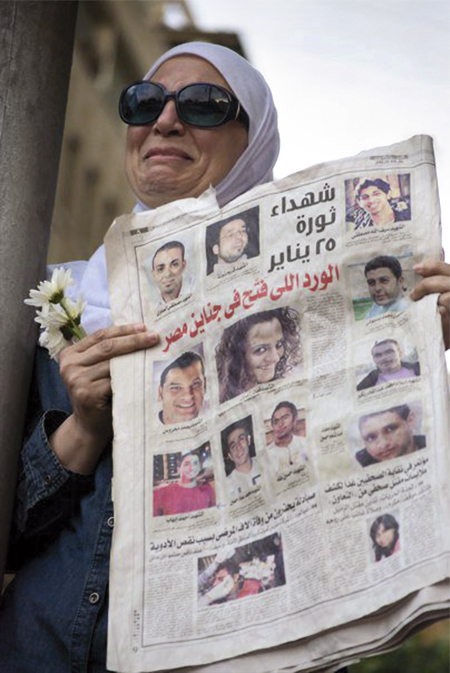
An Egyptian woman walks the 6th October bridge in protest, as another holds a newspaper reporting the fatalaties caused by the struggle.
The protests had no leader, discrediting conspiracy theories that they were organised by the Muslim Brotherhood/ foreign powers/ Israel/ Darth Vader! It gave them more credibility, showing them to be truly a representation of Egyptian society, but at the same time it made them more dangerous. There is, as of yet, no clear vision of what the future will hold. The people wanted to topple the regime, but there is no obvious candidate for who they want in charge. And is there really anyone qualified? The people want a democracy, they want to be able to work, eat, send their children to school and get treatment when needed. They want to have their rights.
As we go to press, Hosni Mubarak has just stepped down. His speech on February 10th, the day prior to his removal, succeeded in uniting the Egyptian people—against him. For the first time, protesters headed to Heliopolis, where he lives. The army maintained a neutral position, neither supporting the president nor the people. Protests increased in size, swelling beyond the epicentre of Tahrir Square. There were rumours that troops were threatening to remove their uniforms if things were not resolved quickly. Finally, power was transferred to the Supreme Council for the Armed Forces. It would seem the people had won.
Economically, there is no doubt the country has suffered. Official reports say that GDP is expected to grow 3.7% this year, down from 5.7% last year. The country has lost an estimated US$310 million a day, not including the significant losses from tourism, Egypt’s cash cow. Food inflation is up 18%, urban inflation 11%. Economically, it is going to take us a long time to get out of this. Wael Ghonim tweeted after the fall of the President, “A call to all well-educated Egyptians around the world. Come back ASAP to build our nation.”
But no matter what happens, there’s no denying that 25th Jan was a turning point in Egyptian history. A new Egypt is in the process of being born, one that will hopefully emerge stronger and more beautiful than ever.
I am so proud to be an Egyptian.
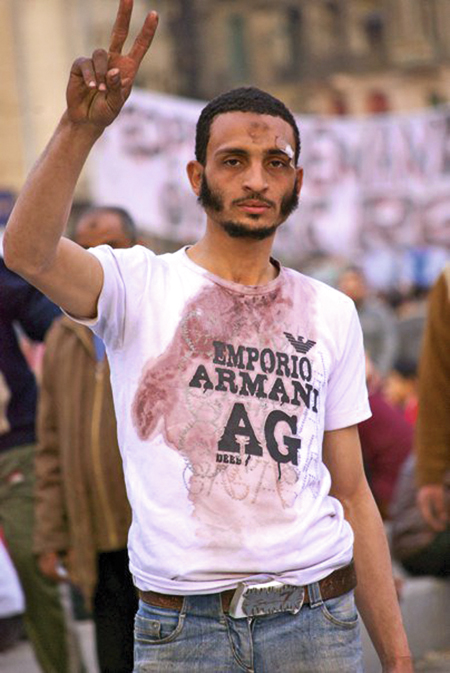
Related Stories >>>
After over 20 years in exile, the Jasmine Revolution compels London lawyer Intissar Kherigi to return to her native Tunisia.
Photography Credits - Associated Press, Ghazala Irshad, Charles Onians, Ghazala Irshad, Nour el Refai
Bookmark this |
|
Add to DIGG |
|
Add to del.icio.us |
|
Stumble this |
|
Share on Facebook |
|
Share this |
|
Send to a Friend |
|
Link to this |
|
Printer Friendly |
|
Print in plain text |
|


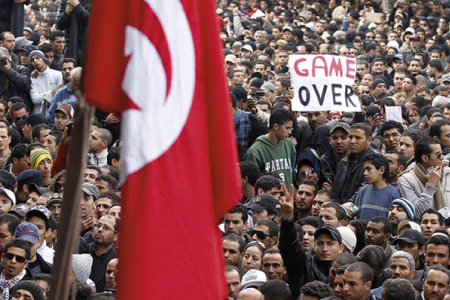
Comments
0 Comments